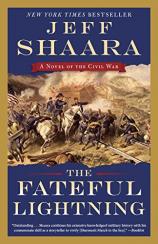The Fateful Lightning: A Novel of the Civil War
Review
The Fateful Lightning: A Novel of the Civil War
In 2012, Jeff Shaara took us back to his old stomping grounds: the US Civil War. Only this time around, he was focusing his attention on the events of the Western Theater --- areas of the war that tended to get overlooked by the battles and skirmishes of the Eastern Front --- and the rise of the man who brought stability and success to the Union Army: General Ulysses S. Grant. Now, with THE FATEFUL LIGHTNING, Shaara closes the book on the Civil War.
November, 1864. Georgia. The Union has experienced a great surge, and their successes are mounting. General George Tecumseh Sherman is more than eager for the war to be over. He wants nothing more than to crush the Confederacy --- physically and mentally --- and return home. When THE FATEFUL LIGHTNING begins, Atlanta has been burned already. Grant and Lincoln have concerns about the plan from Sherman, but Grant has faith in his friend, sending him words of encouragement: “Go as you propose.” With that approval, Sherman is ready for his Savannah Campaign, better known as his infamous March to the Sea, where his Union soldiers will torch anything that he feels would bolster a Confederate fighting spirit, cutting their way through the heart of Confederate territory.
As Sherman and his men make their way across Georgia, they liberate towns and cities. In their wake, rising from the ashes and smoke, a conglomeration of freed slaves begins to follow in the footsteps of their liberators. Thousands of them would fall into line behind the marching troops, including Franklin.
"THE FATEFUL LIGHTNING is a great accomplishment and a more than fitting conclusion to Shaara’s work on the Civil War."
Just as he did with Lucy Spence, the young woman who suffered the horrors of the siege of Vicksburg in A CHAIN OF THUNDER, Shaara gives voice and perspective to a commoner. This simple soul, a freed slave who was the property of Georgia governor Howell Cobb, becomes as much the heart of the story as anyone. He is introduced to letters, works as an aide to an Ohio officer, watches the movements of the army and, when necessity required it, took up arms and fought. He is the son of a man so wounded by his owner that he refuses to flee the plantation, sending his boy alone into freedom with the Blue Coats.
The brutality of slave life is presented, as is the story of the role of black soldiers and spies. Shaara also touches on the racism that existed within the Union ranks, along with some of the horrendous treatment the men of power within Sherman’s command inflicted upon those freed slaves who followed. With sharply honed skills over the many years of writing, Shaara capably weaves these stories throughout the war narrative with the flair of a craftsman. It is compelling, moving and downright haunting at times.
While Shaara follows his pattern of shifting points of view, from Franklin to Joseph Wheeler, James Seeley and Joseph E. Johnston, the main voice of THE FATEFUL LIGHTNING is, in fact, the man who still calls up the hurt and hate of many in the South: Sherman. His tactic of total war --- the idea that you cannot win by capturing a capital, you have to defeat your enemies --- is openly played on these novels. It is this willingness to defile all of the southern infrastructure that brings the Confederacy to its knees more readily. It was a tremendously terrible advance, which historians have come to label as being revolutionary, masterfully operating an armed force deep within enemy territory without supplies or communications.
When Savannah falls, Sherman prepares to drive north into the Carolinas. The hope is that with his force driving north and Grant’s driving south, the two combined will crush Robert E. Lee, who is trapped between them. Though the two armies would never connect, it would not be a failure. Lee would surrender to Grant at Appomattox Court House, and Sherman would accept the surrender of Johnston in North Carolina. Between these two successes, Abraham Lincoln would be struck down.
Shaara presents William Hardee’s poignant reflections on the demise of the Confederacy, and it is very much an engaging moment in the book. But the meeting of Sherman, Grant and Lincoln in City Point, Virginia, as the two men prepare for the push that would bring an end to the war, is a resounding success. As readers who have the benefit of history on our side, we know that Lincoln will fall to an assassin’s bullet weeks later. This moment was the first meeting of Lincoln and Sherman, and upon news of the President’s death, Sherman would be rocked with grief. It would be Sherman who revealed the death of the President to a surrendering Johnston, who expressed his own despair as the two men sought to begin the process of healing a divided nation. We also see Sherman as the more benevolent as he is embroiled in a public debate with Secretary of War Edwin M. Stanton over sanctions against the South. How insightful that Sherman, the man who scorched the earth in Georgia and sought utter destruction to all in his path, was the one urging for reconciliation and a gentler reunification.
THE FATEFUL LIGHTNING is a great accomplishment and a more than fitting conclusion to Shaara’s work on the Civil War. The history itself is a true marvel, and the ultimate gift that he brings to readers is the humanity of those involved and the difficulties it entailed to be thrust into such momentous events. Now Shaara will seek to bring this skill set to another battlefront, this time giving long overdue attention to Korea. If his work there is only half as good as it has been in this series, it will be amazing.
Reviewed by Stephen Hubbard on July 2, 2015
The Fateful Lightning: A Novel of the Civil War
- Publication Date: June 14, 2016
- Genres: Fiction, Historical Fiction
- Paperback: 640 pages
- Publisher: Ballantine Books
- ISBN-10: 034554921X
- ISBN-13: 9780345549211





